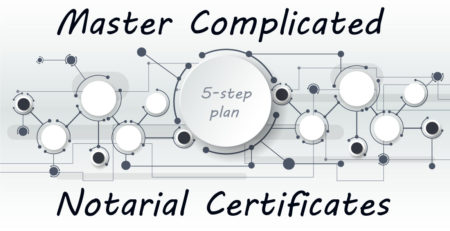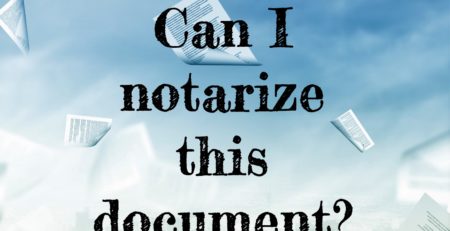Handling Commercial Loan Documents as a Notary Signing Agent
Are you ready to handle commercial loans as a notary signing agent? There are four standards to meet before you do so.
Preparing to Handle Commercial Loans
- Know how to be a great notary. You must be extremely confident of how to handle any document that requires notarization. It should go without saying that you need to know every element of a notarial certificate and be able to recite and write out the language that goes in your state’s certificates of acknowledgment and jurats (for individuals) from memory. You should have at least $100,000 in errors and omissions insurance (in my opinion) and should be familiar with how to handle complex entity notarial certificates. You must take formal notary training and review the materials regularly. The best courses for the price are here on Notary.net.
- Secondly, be extremely skillful at handling residential loan signings. How good do you have to be? I recommend that you be so good at handling residential loan signings that you are willing to bet your entire fee that you can handle any loan package sight unseen without error, and that you are comfortable at sight reading through a stack of documents without applying sticky notes or reviewing documents ahead of time. Yes, everyone makes mistakes, but if you bet your fee on it, you’ll be extra careful!
- Know how to run through a HUD-1 settlement statement in the midst of chaos. While residential mortgage loans require the more familiar Closing Disclosure, the HUD 1 is the preferred statement for commercial mortgages. Chaos is quite common at a commercial loan closing table. Study the HUD-1 and learn where everything is on the form.
- Finally, know every commercial loan’s core documents inside and out. These documents are the backbone of every commercial mortgage loan and have 99.9% of the answers. Commercial mortgage loans’ core documents are listed below along with linked forms to help you start learning now while you ramp up your skills.
Core Commercial Loan Documents
Note
Commercial mortgage notes look similar to residential mortgage loan packages and will set forth the terms of the financing. At times, a note in a commercial package will require notarization. If you don’t see a certificate, you are not required to notarize it. Usually, only the borrower signs the note. Here is a good example of a note.
Loan Agreement
A loan agreement provides all things that any party has agreed to. All involved parties sign the loan agreement. You can see a simple loan agreement here.
Mortgage or Deed-of-Trust
The Deed of Trust (or mortgage, depending on your state) is usually called Mortgage/Deed of Trust, Security Agreement, Financing Statement and Assignment of ___ where the blank may include terms like “production” or “rents.” It will be notarized. You can see one here on Sec.gov.
Error and Omissions Agreement (aka Compliance Agreement)
The error and omission agreement aka compliance agreement is familiar to most notary signing agents. It says if there is an error or omission the borrower will work with the lender to correct the documents. Here is an example. Another example is here.
Guaranty
The document known as a guaranty establishes that someone will co-sign the loan documents. I have two examples for you. One is here (not notarized), and there is one here which is notarized.
More Reading…
Share this post
Leave a Reply
You must be logged in to post a comment.













Comment (1)
Excellent article